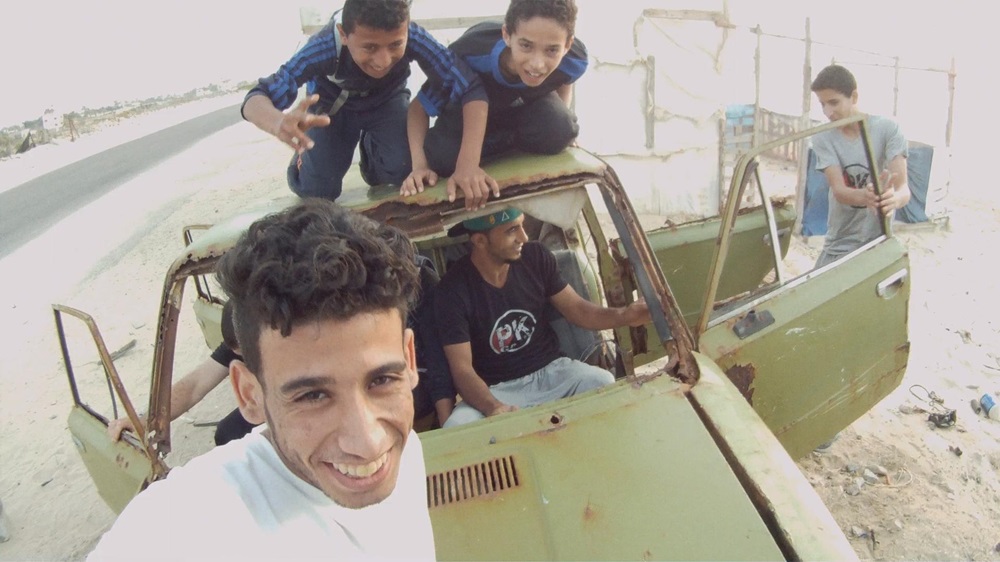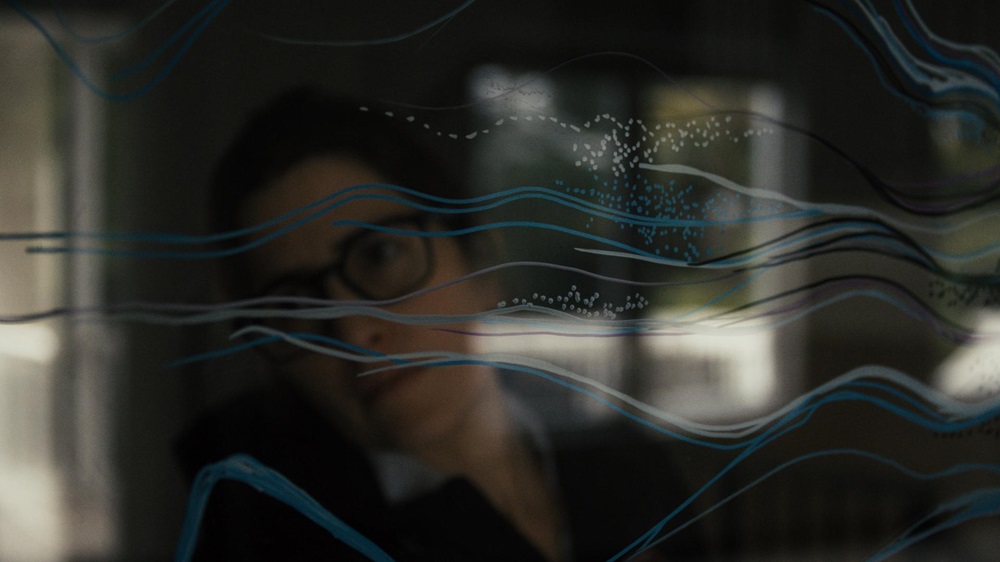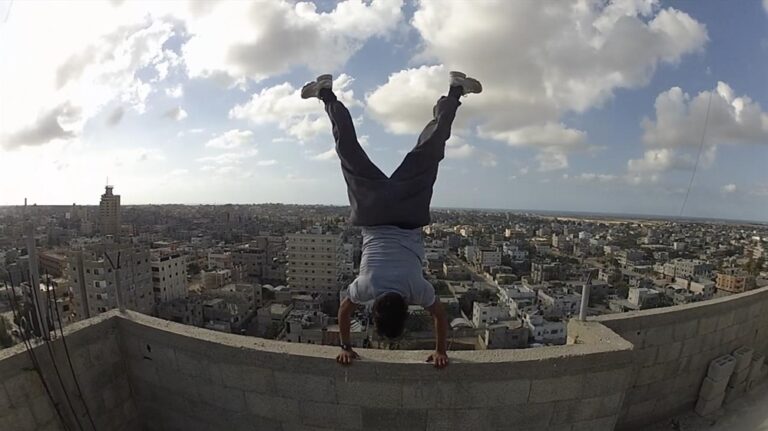The filmmaker then contrasts the boundless athleticism of young Palestinian parkour athletes with the walls, rubble, and checkpoints that circumscribe their existence. Over the course of its decade-long narrative, it becomes clear: this isn’t just a story about the daring flips and impossible leaps of parkour—it’s about what it means to keep moving forward when every step is against the tide. What begins as a quest to reconnect with her roots turns into something deeper: a meditation on endurance, adaptation, and, most importantly, survival.
More DOC NYC Coverage: ‘My Sweet Land’: The Weight of Inherited Wars Seen Through a Boy’s Eyes
Parkour as Resistance and Expression
Zuaiter began her journey in 2015, after stumbling upon an amateur video of Gaza’s parkour scene, which depicted young men practicing their craft against a backdrop of ruins. Among them was Ahmed Matar, whose lithe grace and quiet determination became the film’s centerpiece. What started as a filmmaker’s curiosity soon became an intimate collaboration, as Zuaiter exchanged videos and conversations with Ahmed from her home in Washington, D.C. Their long-distance connection mirrored the theme of the film itself: a yearning for Gaza that was both deeply personal and steeped in collective history.
“Yalla Parkour” grounds itself with Zuaiter’s recollection of her first childhood visit to Gaza with her mother, a memory steeped in warmth yet shrouded by loss. After her mother’s death in 2012, Zuaiter’s nostalgia for Palestine intensified, and her search for a way back—if not physically, then at least emotionally—led her to Ahmed and his friends. Through them, she witnesses the contradictions of Gaza: its bombed-out malls and crumbling buildings are transformed into stages of daring athletic feats, even as the specter of occupation looms over every jump. The athletes’ bodies seem to defy gravity, but the ground beneath them tells a different story.
“Yalla Parkour” doesn’t just capture parkour’s acrobatic grace. Instead, it transforms the sport into a metaphor for resistance, both physical and psychological. As Zuaiter finds herself drawn to the footage of these young men practicing their flips, jumps, and vaults through bombed-out malls and rubble-strewn streets, she also discovers a powerful image of a people who refuse to be defeated. Their actions—athletic, daring, and joyous—are set against a backdrop of unimaginable destruction, where every leap over a crumbling wall feels like an assertion of life itself.

Filming Everyday Stories with Observational Intimacy
What makes “Yalla Parkour” resonate so deeply is its ability to capture moments of fleeting joy against the backdrop of unrelenting despair. Watching Ahmed and his crew turn ruins into playgrounds is exhilarating; their movements are acts of defiance, artistry, and hope. The cinematography, a collaborative effort between Ibrahim Al-Otla, Marco Padoan, and Umit Gulsen, underscores this tension beautifully. Every frame feels alive with contrast: the athletes soaring through the air, their shadows cast against the remnants of what used to be homes, schools, and businesses.
Zuaiter captures these moments with a deliberate yet intimate approach, allowing the camera to linger on the athletes’ triumphs and stumbles. More importantly, she becomes a participant in the narrative, too. Through her correspondence with Ahmed, we see her grappling with her own identity and her longing for a homeland she’s been separated from for decades.
With this choice in storytelling, Zuaiter eschews omniscience and instead opts for collaboration; blending Ahmed’s footage with her own into a dialogue between two people—and two worlds. This interplay enriches the film, bridging the chasm between exile and home. Quiet moments, such as her reflection flickering across her laptop screen as she watches Ahmed’s joyous expressions, encapsulate transcendent connections that survive even the most harrowing separations.

Gaza’s Fragile Future
As the timeline shifts toward the present, “Yalla Parkour” gains urgency. As Zuaiter shifts her gaze to 2024, the still-ongoing conflict casts a devastating pall over the decade of footage she’s amassed. Ahmed’s journey, from his struggles to secure a visa to his eventual relocation to Sweden, becomes a parallel story of displacement and longing. Even as he finds freedom abroad, the pull of Gaza remains, leading him to return just before October 2023’s devastating escalation.
These scenes capture the inescapable weight of diaspora. Ahmed’s story, mirrored by Zuaiter’s reflections on her mother and her homeland, highlights a heartbreaking truth: to leave Gaza is to gain freedom but to lose a part of oneself. True enough, a quiet moment toward the end of the film sees Zuaiter reflecting on her mother’s influence and how she instilled in the filmmaker a sense of gratitude and not guilt, despite the circumstances. “But I don’t know how to just now,” she confesses with hesitation. It’s a small, quiet line, yet it speaks volumes.
Finally, the film’s closing moments are devastating, featuring a list of memorials—athletes, friends, and collaborators lost to airstrikes—a grim reality check of the cost of existence in Gaza. The juxtaposition of their joyful flips and the tragedies that follow is heartbreaking, but it never feels exploitative. Instead, it amplifies the film’s central theme: the resilience of the human spirit in a world determined to crush it.
More DOC NYC Coverage: ‘Forest’: A Portrait of Compassion and Conflict on the Border
‘Yalla Parkour’: A Defiant Movement in a Stagnant World
If “Yalla Parkour” succeeds—and it largely does—it’s because it balances joy and devastation without diminishing either. Zuaiter’s direction ensures that every leap and stumble feels monumental, not just as athletic feats but as acts of survival. Her collaboration with Ahmed and his team results in a film that is both deeply personal and universally resonant, a testament to the power of human creativity in the face of unimaginable hardship.
Whether one views “Yalla Parkour” as a tribute to Gaza’s indomitable spirit or a meditation on the weight of diaspora, it’s hard to deny the film’s emotional power. It’s a film about movement—physical, emotional, and political—in a place where movement is often impossible. Zuaiter and the parkour team have given us a reminder that there’s something undeniably human about the desire to leap, to soar, and to defy forces that might try to stifle us. And such movement, no matter how small, is already a victory in and of itself.

Areeb Zuaiter’s “Yalla Parkour” had its world premiere in the International Competition at this year’s DOC NYC, where it won the top award for the category, the Grand Jury Prize. The festival runs from November 13 to December 1, 2024. Follow us for more coverage.


